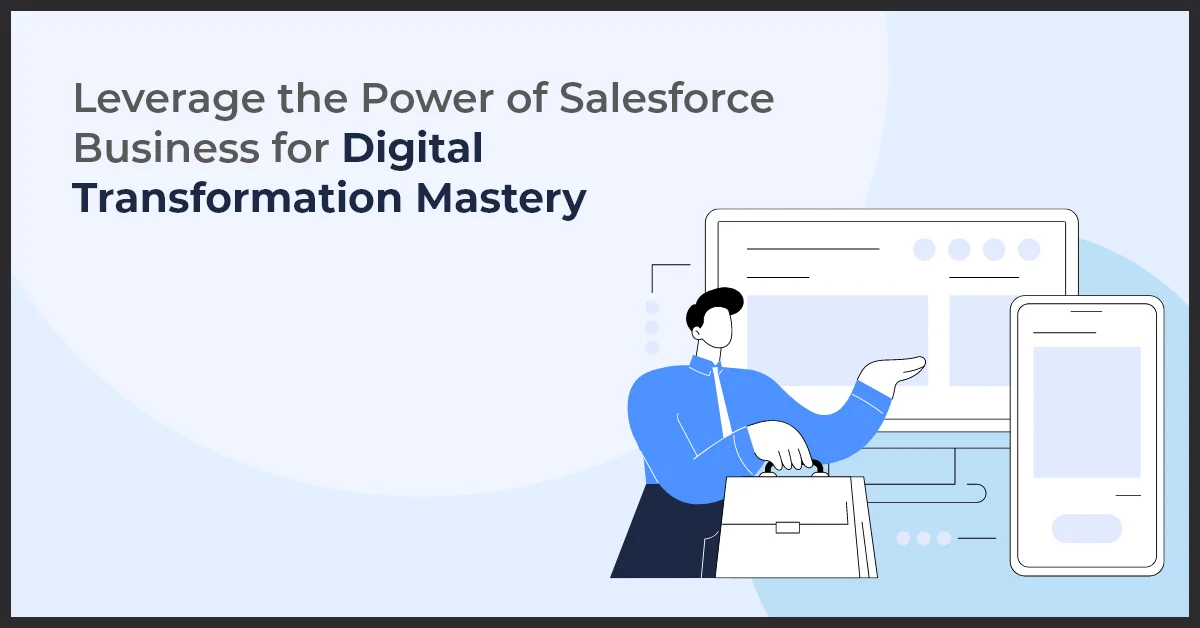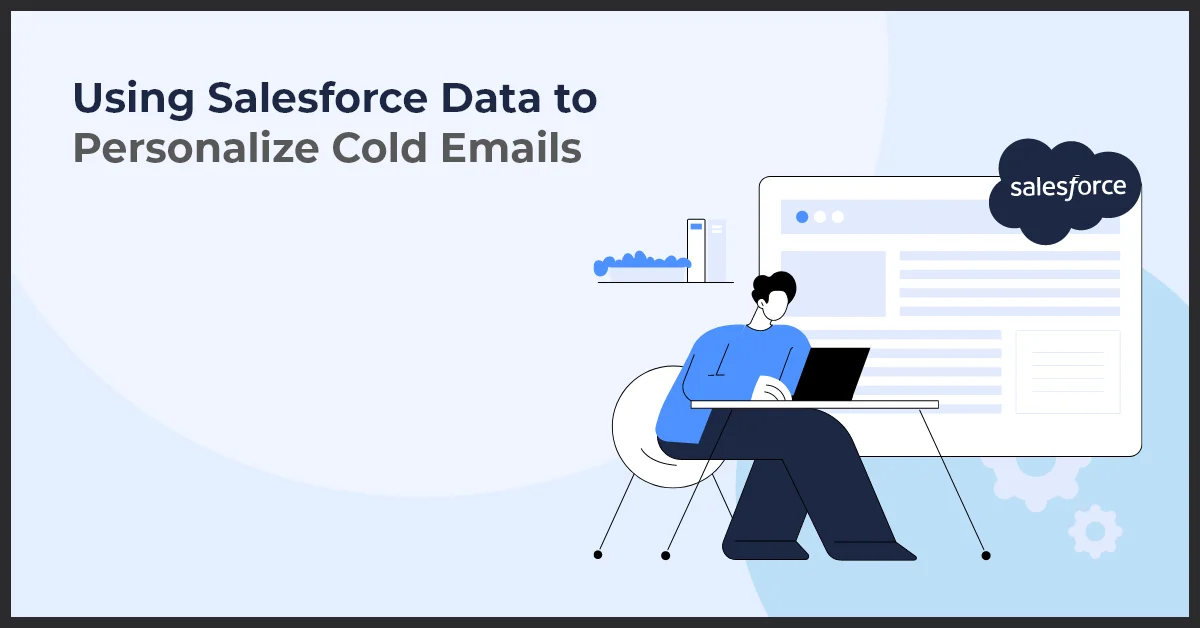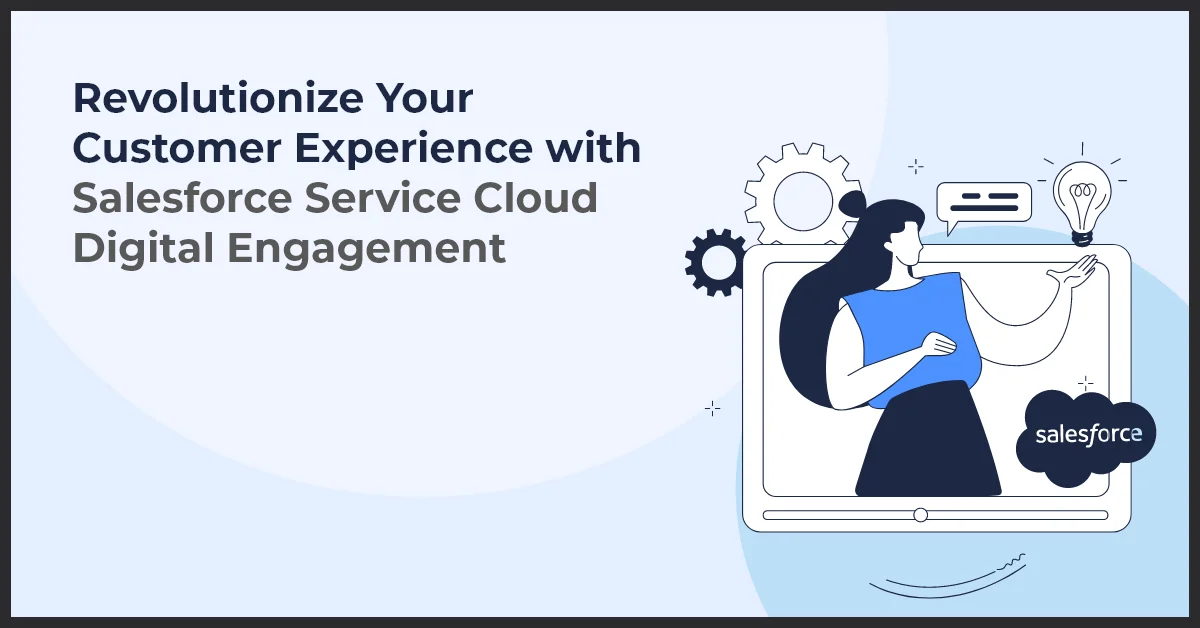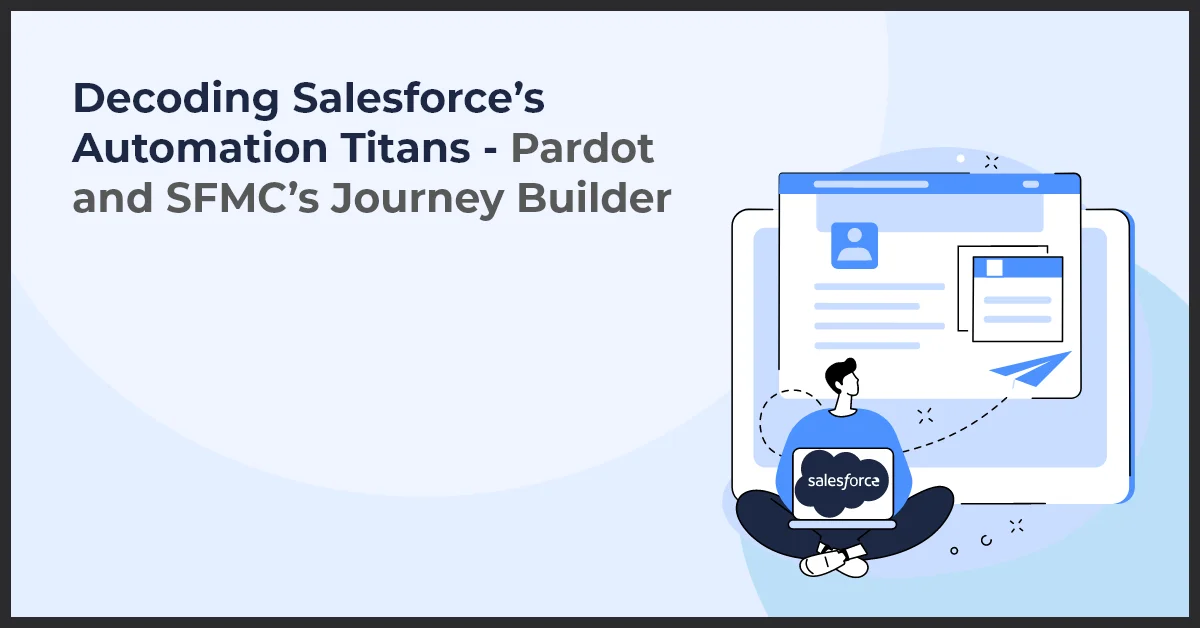Leverage the Power of Salesforce Business for Digital Transformation Mastery

Published on: April 1, 2024
Updated on: July 12, 2024
494 Views
- Salesforce
15 min read
As a robust platform, Salesforce has become synonymous with dynamic change, propelling businesses into future-ready enterprises. With its visionary role in digital transformation, Salesforce enables organizations to reimagine their operational models, ensuring remarkable growth and customer satisfaction.
At the heart of this revolution lies Salesforce's comprehensive approach to Customer 360—a unified customer experience strategy that gives businesses a competitive edge through integrated customer intelligence. Dive into our in-depth exploration of how Salesforce business solutions can transform your company, stitch siloed functions together, and deliver an unparalleled customer journey from start to finish.
Customer Relationship Management (CRM) Enhanced by Salesforce
Salesforce has redefined the way businesses understand and manage customer interactions and relationships. By leveraging the power of the world's leading CRM platform, companies are experiencing unprecedented benefits.
Benefits of Salesforce Business for Organizations
- Improved Customer Data Management
- Enhanced Communication
- Automation of Routine Tasks
- Advanced Analytics
- Higher Customer Retention
Differentiating Sales, Marketing, and Service CRM Functionalities
Salesforce Business segments functionalities to address the unique needs within each domain:
- Sales: Tools like Sales Cloud assist with managing leads, opportunities, and customer accounts.
- Marketing: Marketing Cloud provides a suite for creating and tracking marketing campaigns.
- Service: Service Cloud focuses on customer service and support, offering case management and customer self-service features.
How Salesforce Business Fosters a Customer-Centric Environment?
By integrating various customer interactions across channels, Salesforce Business ensures a seamless and personalized customer journey. It allows businesses to:
- Understand customer needs and preferences in-depth.
- Respond promptly and effectively to customer inquiries and issues.
- Deliver consistent and relevant experiences throughout all touchpoints.
With such capabilities, Salesforce equips businesses to build a robust customer-centric strategy that drives growth and success.
Pro Tip: Utilize Salesforce to gain insights into customer behavior, preferences, and interactions, enabling personalized and targeted communication strategies that foster stronger customer relationships and drive business growth.
Salesforce Cloud Solutions Overview
As enterprises strive to navigate the complex landscape of customer relations and sales operations, understanding the array of Salesforce Cloud Solutions is critical. These solutions, designed to optimize business processes, harness the power of cloud computing to deliver unparalleled efficiency and insights for sales and marketing teams. This overview delves into the core components of Salesforce's cloud-based offerings and their distinct advantages to modern businesses.
Sales Cloud, Service Cloud, and Marketing Cloud
Salesforce Sales Cloud is tailored specifically to streamline the sales process, making managing leads, opportunities, and customer interactions easier. The Service Cloud emphasizes customer service and support, ensuring seamless case management and customer satisfaction. Completing the trio, the Marketing Cloud empowers teams to create and track customer journeys, design targeted campaigns, and understand the impact of their marketing strategies across various channels.
Product-Specific Advantages for Sales and Marketing Teams
- Sales Cloud
- Service Cloud
- Marketing Cloud
Unified Customer View
A cornerstone of Salesforce's efficacy is its ability to provide a unified view of the customer. Businesses comprehensively understand customer behaviors, preferences, and interactions by integrating Sales Cloud, Service Cloud, and Marketing Cloud. This integration is paramount in delivering cohesive and personalized customer experiences, driving sales performance, and nurturing customer loyalty in an increasingly competitive landscape.
Pro Tip: Integrate Sales Cloud, Service Cloud, and Marketing Cloud to deliver personalized experiences, drive sales performance, and foster customer loyalty through cohesive and targeted strategies across all touchpoints.
Elevating Sales Strategy with Salesforce Automation (SFA)
Salesforce Automation (SFA) is at the forefront of revolutionizing sales strategies for businesses of all sizes. By leveraging SFA, sales teams can achieve higher productivity levels, maintain better customer relationships, and close deals faster, dramatically impacting the bottom line.
The Importance of SFA for Sales Teams
SFA systems transform sales processes from time-consuming and manual to streamlined and efficient. Effective use of an SFA tool can lead to improved sales forecasting, enhanced communication, and reduced administrative tasks, allowing sales personnel to focus on what they do best—selling.
Key Features of Salesforce Automation Tools
- Lead Management
- Opportunity Management
- Email Integration
- Reports and Dashboards
- Sales Forecasting
Master Marketing Automation and Campaign Management with Salesforce
Embracing digital transformation is pivotal in today's business landscape, and Salesforce stands at the forefront, especially in marketing automation and campaign management. Salesforce offers robust tools that streamline and enhance marketing efforts, driving efficiency and effectiveness across your campaigns.
Personalizing Marketing Efforts with Data Insights
Data is the new currency in marketing, and Salesforce delivers in spades. The platform provides deep insights into customer behavior, preferences, and engagement. Businesses can use this data to craft highly personalized marketing initiatives that resonate with their audience, improving overall customer experience and brand loyalty.
Lead Nurturing and Conversion with Salesforce's Marketing Automation Tools
Transform potential leads into loyal customers with Salesforce’s advanced marketing automation tools. These solutions allow for sophisticated lead nurturing strategies, including targeted email campaigns, social media interaction, and personalized content delivery. By leveraging Salesforce business insights, companies can precisely guide leads through the sales funnel, significantly boosting conversion rates.
As businesses continue to adapt to the shifting landscapes of digital marketing, Salesforce stands as an indispensable ally, driving both efficiency and growth. With its unmatched marketing automation and campaign management capabilities, Salesforce business users are equipped to outpace competition and captivate their market.
Pro Tip: Leverage Salesforce's deep data insights and advanced marketing automation tools to position your business for growth and success in the ever-evolving digital marketing landscape.
Artificial Intelligence Crafted for Business: Salesforce Einstein
Salesforce Einstein is a cutting-edge artificial intelligence (AI) technology developed exclusively for the Salesforce platform. By leveraging the power of AI, Salesforce Einstein transforms how businesses interact with customers, predict trends, and make informed decisions.
Introduction to Salesforce Einstein AI Capabilities
Salesforce Einstein is integrated directly into the platform, delivering AI capabilities to every aspect of the business. It analyzes your data, delivering predictions and recommendations based on your unique business processes and customer data. This seamless integration ensures smarter decision-making and enhances the productivity of sales, service, and marketing efforts.
Use Cases: Predictive Analytics in Sales and Marketing
By applying predictive analytics to sales, Salesforce Einstein empowers sales representatives with insights to pinpoint opportunities, forecast outcomes, and prioritize leads. In marketing, Einstein's predictive analytics fine-tune customer segmentation and personalize campaign content, ensuring the right message reaches the right audience at the optimum time.
Enhancing Customer Service with AI-driven Insights
Customer service benefits significantly from Salesforce Einstein's capabilities. AI-driven insights help service agents resolve issues more efficiently, offering personalized, proactive service that anticipates customer needs. With Einstein, every customer interaction becomes an opportunity to delight and build deeper relationships.
- Predictive analytics enable proactive issue resolution and targeted customer engagement.
- AI-powered insights help tailor service strategies, improving overall customer satisfaction.
- Automated case routing and recommendations empower agents to handle queries more effectively.
Pro Tip: Harness the power of Salesforce Einstein for better decision-making, personalized customer interactions, and proactive issue resolution, ultimately driving improved customer satisfaction and business success.
Integrating and Extending Salesforce with APIs
At the heart of a coherent and highly functional business technology landscape lies the ability to seamlessly integrate and extend applications. As a leading CRM platform, Salesforce doesn’t stand alone – it is a centerpiece that connects with various enterprise solutions, external applications, and services. This integration is largely achieved through its robust Application Programming Interfaces (APIs).
The Role of Salesforce Integration and APIs
APIs are the backbone of digital interaction, acting as bridges that allow different software systems to communicate with Salesforce. This integration capability ensures that the Salesforce environment can be customized and expanded to meet the unique requirements of a business. By leveraging Salesforce APIs, companies can synchronize data across applications, automate processes, and provide a unified customer experience.
How Integrations Contribute to a Seamless Business Ecosystem
By integrating Salesforce with other business systems through APIs, companies can ensure that their CRM does not exist as an isolated entity but is intrinsically connected to the entire corporate structure. This connectivity offers comprehensive insights into customer behavior, preferences, and more – fostering an environment where data drives strategic business decisions, leading to enhanced operational efficiency and customer satisfaction.
- Automation across platforms reduces manual data entry and errors
- Real-time data sync provides a 360-degree view of the customer
- Custom integrations offer tailored solutions that match exact business needs
- APIs facilitate connections with third-party solutions, enhancing the CRM’s functionality
Pro Tip: Maximize the potential of Salesforce by leveraging its robust APIs to seamlessly integrate with other business systems, ultimately leading to improved operational efficiency and customer satisfaction.
Harness the Full Potential of the Salesforce Platform and AppExchange Ecosystem
Salesforce is not just another CRM; it's a comprehensive platform designed to take your business to new heights. With its innovative capabilities and the thriving AppExchange ecosystem, Salesforce offers endless possibilities to optimize and extend your business processes. Understanding how to maximize these tools is pivotal for any Salesforce Business.
Extending Product Functionality with AppExchange
One of the key strengths of the Salesforce ecosystem is AppExchange—Salesforce's app marketplace. The AppExchange houses thousands of third-party business applications, each designed to integrate seamlessly with Salesforce, adding extra layers of functionality to your existing CRM systems. From managing finances to enhancing customer service, these apps can address various niche business areas, driving increased efficiency and performance.
Selecting the Right Apps for Your Business
With the myriad of options available on the AppExchange, finding the right apps to meet your business needs can be daunting. Identify your key objectives and pain points to ensure you choose apps aligning with your business strategy. Look for verified reviews, consider the app developers' support and update policy, and ensure a synergy between the app's features and your business processes. Always opt for solutions that offer flexibility and scalability as your business grows.
- Identify and prioritize business needs.
- Search for apps with high ratings and positive reviews.
- Consider developer reputation and support offerings.
- Evaluate the app's compatibility with your current tech stack.
- Look for flexibility and scalability to future-proof your investment.
Pro Tip: When selecting apps from the AppExchange, prioritize solutions that align with your business objectives, have high ratings and positive reviews, offer strong developer support and compatibility with your tech stack, and provide flexibility and scalability to accommodate future growth.
Salesforce and Sales Performance Management
Efficient sales performance management (SPM) is the cornerstone of successful business strategies. With Salesforce at the forefront, organizations can tap into powerful tools to streamline and enhance their sales processes. The sales strategy alignment with Salesforce functionality enables teams to track, analyze, and elevate their sales operations to unprecedented levels.
Aligning Sales Strategy with Salesforce Tools
By leveraging Salesforce tools, businesses can ensure their sales strategies reflect realistic goals and objectives based on data-driven insights. Salesforce's sophisticated analytics and customizable dashboards provide a comprehensive sales pipeline view, enabling decision-makers to adjust their strategies.
Monitoring and Improving Sales Performance Metrics
Key to sales success is the constant monitoring of performance metrics. Salesforce enables seamless sales data analysis by helping teams hone in on metrics such as lead conversion rates, customer acquisition costs, and average deal sizes. With this information at their fingertips, sales managers can promptly identify improvement areas and take corrective action.
Pro Tip: Utilize Salesforce's sophisticated analytics and customizable dashboards to align sales strategies with realistic goals, continuously monitor key performance metrics, and promptly identify improvement areas to enhance sales operations and drive business success.
Collaboration in the Cloud with Salesforce Chatter
Salesforce Chatter revolutionizes internal communications, fostering an environment where collaboration and productivity thrive. As an integral part of the Salesforce ecosystem, Chatter enables teams to connect seamlessly, ensuring everyone—from sales to marketing and beyond—is in the loop and on top of their game.
Improving Internal Communications with Chatter
With the introduction of Chatter, Salesforce businesses have seen a transformation in how team members exchange information. The platform elevates the standard of internal communications by allowing instant messaging, post updates, project announcements, and sharing of relevant content. This real-time interaction streamlines workflow and encourages a transparent work culture.
Encouraging Collaboration Among Sales and Marketing Teams
Chatter isn't just a tool; it is a collaborative powerhouse. It breaks down silos between sales and marketing teams, allowing for strategic alignment and unified objectives. Sharing insights, leads, and data within Salesforce has never been easier, and this collaboration results in a cohesive approach toward achieving business targets.
Best Practices for Chatter Use Within Salesforce Environments
- Define Clear Usage Guidelines
- Encourage Adoption Across the Organization
- Integrate Chatter with Daily Workflows
- Moderate and Monitor
Embrace the power of cloud collaboration with Salesforce Chatter and witness a marked improvement in team performance and business outcomes.
Delivering Outstanding Customer Service and Support with Salesforce
Providing exceptional customer service is a cornerstone of any successful business strategy. Salesforce, with its comprehensive suite of service solutions, presents unparalleled capabilities to organizations aiming to exceed customer expectations. Optimally utilizing the Service Cloud allows businesses to transform their customer service approach and create lasting relationships grounded in satisfaction and loyalty.
Strategies for Delivering Exceptional Customer Service
Crafting a customer service strategy with Salesforce involves more than just addressing incoming queries; it's about creating an environment where customers feel truly valued. It encompasses proactive service, such as addressing issues before they arise, personalizing interactions based on customer data, and continuously implementing customer feedback to refine the service experience. When businesses fully leverage these strategies within Salesforce, they elevate customer service.
Harnessing Salesforce Solutions for Customer Loyalty and Retention
The ultimate goal of outstanding customer service is to turn happy customers into loyal advocates for the brand. Salesforce Service Cloud aids in achieving this by streamlining the resolution process, providing comprehensive support channels, and leveraging AI-powered insights to personalize interactions. With tools designed to anticipate customer needs and facilitate ongoing engagement, Salesforce enables businesses to satisfy customers momentarily and build enduring loyalty that drives repeat business and positive word-of-mouth referrals.
- Implement omnichannel support to meet customers on their preferred platforms.
- Use automated case routing to increase efficiency and speed up response times.
- Engage in predictive service by analyzing data to anticipate customer issues.
- Foster customer empowerment through self-service portals and comprehensive knowledge bases.
- Continuously collect and act upon customer feedback to improve the service journey.
Pro Tip: Utilize Salesforce Service Cloud to implement omnichannel support, automate case routing, engage in predictive service, empower customers with self-service options, and continuously collect feedback to enhance the overall service journey, fostering customer loyalty and retention.
Transitioning to the Salesforce Lightning Experience: Benefits and Best Practices
Salesforce Business has continually evolved to meet the dynamic needs of sales and marketing professionals. With the introduction of the Salesforce Lightning Experience, businesses are poised to harness an even more powerful CRM tool. This cutting-edge interface offers a range of enhanced features and a modernized user experience compared to Salesforce Classic.
Advantages of Migrating to Lightning for Sales and Marketing Teams
Switching to the Lightning Experience brings a host of benefits that directly empower sales and marketing teams:
- Enhanced analytics allow for better data visualization and informed decision-making.
- New AI capabilities with Salesforce Einstein to predict customer behavior and sales outcomes.
- Improved collaboration between teams with more integrated communication tools.
- Higher levels of customization to tailor the platform to exact business needs.
Planning a Successful Lightning Transition
Adopting the Lightning Experience requires careful planning to ensure a smooth transition:
- Conduct an audit of your current Salesforce setup to assess necessary changes.
- Engage stakeholders from all departments early in the planning process.
- Prepare your team with training resources to help them adapt to the new interface.
- Roll out the new platform in phases to monitor performance and gather feedback.
- Utilize Salesforce's in-built migration tools and seek assistance from certified Salesforce consultants.
By following best practices and focusing on the advantages, Salesforce Business users can maximize the potent capabilities of the Lightning Experience. This transition is not just an upgrade—it's a significant leap forward for any organization looking to drive their sales and marketing productivity to new heights.
Key Takeaways
- Salesforce enables comprehensive digital transformation by offering a unified customer experience strategy that integrates customer intelligence across channels, driving growth and customer satisfaction.
- Salesforce Business revolutionizes customer relationship strategies with improved data management, enhanced communication, task automation, advanced analytics, and higher customer retention rates.
- Salesforce offers specialized CRM functionalities tailored for sales, marketing, and service, providing tools like Sales Cloud for lead and opportunity management, Marketing Cloud for campaign creation and tracking, and Service Cloud for customer support and self-service features.
- Leveraging Salesforce Automation, businesses can enhance productivity, streamline sales processes, and drive higher conversion rates, ultimately contributing to business growth and success.
Conclusion
Recognizing the importance of a comprehensive CRM strategy is paramount. Salesforce delivers an integrated suite that transcends simple customer management. It envelops marketing, sales, customer service, and business analytics, providing an all-encompassing cloud ecosystem that drives success. This system optimizes each phase of the sales process and propels businesses towards more profound customer engagement and higher revenue growth.
To unlock the full potential of Salesforce, businesses are encouraged to invest in continuous learning and development. Whether you're new to Salesforce or looking to enhance your existing knowledge, numerous resources are at your disposal:
- The official Trailhead platform offers tailored learning paths to skill up on Salesforce.
- For deeper expertise, consider pursuing Salesforce certifications.
- Stay informed about the latest strategies and updates by attending Salesforce webinars and events.
Now is the time to take action. Elevate your sales and marketing strategies with Growth Natives by embracing the powerful capabilities of Salesforce. Email us at info@grawthnatives.com to empower your team with the assistance, knowledge, and skills to thrive in this ever-evolving business landscape.
We encourage and invite you to explore Salesforce with us, learn its ins and outs, and join the ranks of successful businesses that have witnessed remarkable growth and efficiency. Start your Salesforce journey today!
Frequently Asked Questions
Businesses across various industries use Salesforce, including technology, retail, finance, healthcare, and manufacturing. It includes companies of all sizes, from startups to large enterprises.
Salesforce helps businesses by providing a comprehensive platform for customer relationship management (CRM), sales management, marketing automation, customer service, and business analytics. It enables organizations to streamline processes, improve collaboration, personalize customer interactions, and drive growth.
To use Salesforce for business development, businesses can leverage its CRM functionalities to manage leads, track sales opportunities, analyze customer data, and automate marketing campaigns.
A Salesforce Business Manager is typically responsible for overseeing the implementation and utilization of Salesforce within a business. It includes managing Salesforce projects, optimizing configurations to align with business objectives, providing training and support to users, and ensuring business growth and efficiency.



